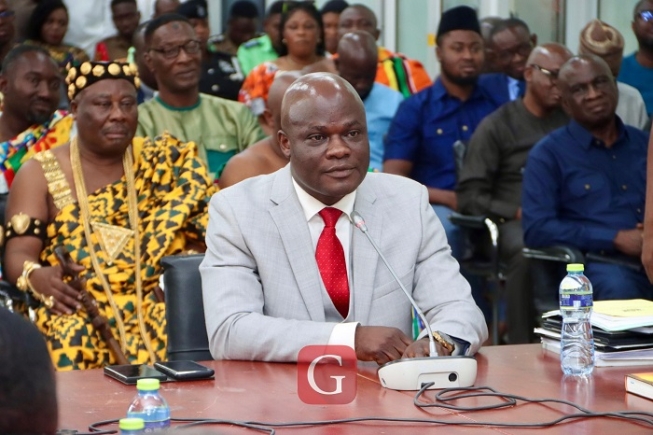
Planning departments cautioned against unprofessional conduct
The Minister for Local Government, Chieftaincy and Religious Affairs, Ahmed Ibrahim, has cautioned physical planning departments of the various district assemblies to desist from unethical and unprofessional conducts.
He said as part of effort to ensure compliance, the Land Use and Spatial Planning Authority (LUSPA) was to conduct compliance monitoring of the spatial planning functions of all district assemblies.
Mr Ibrahim said any assembly or officer found to be acting in contravention of the law would be subject to appropriate sanctions.
The Local Government Minister who gave the caution in a speech read for him by the Chief Executive Officer (CEO) of the LUSPA, Dr Kwadwo Yeboah, at the Annual General Meeting and Capacity Building Conference of the Local Government Service Association of Physical Planners (LoGSAPP), mentioend some of the unprofessional conducts as the collection of unapproved fees from clients for planning, zoning comments that do not align with fees chargeable in assemblies, fee fixing resolutions without appropriate receipts, payment of planning and development permit fees upfront, re-zoning and subdivision of land on the blind side of Spatial Planning Committees without recourse to relevant provisions in the Act 925 and L.I. 2384 and the issuance of permit without recourse to approved local plan.
Re-zoning
He added that the re-zoning of public open spaces, riparian buffer zones, ramsar sites, road reservations, and other reserved and protected areas in contravention of Section 93 (4) of Act 925, granting permit to developers to fill and develop lagoons, wetlands and other ecologically sensitive areas for physical development as well as the clandestine mutilation of local plans to make changes to approved land use zones were all unethical and professionally indefensible, and must stop immediately.
The conference was on the theme; “Planning for resilient, inclusive, climate-sensitive, and disaster-free communities for efficient infrastructure development and service delivery.”
Mr Ibrahim further observed that orderly spatial development at the local level was influenced by the advice and guidance of physical planning officers and that the government’s reset agenda seeks to promote ethical and professional practices, as well as attitudinal changes in approach by institutions and professionals such as MMDAs and physical planning officers.
“ Physical planners are expected to demonstrate creativity, innovation, transparency, and accountability while consistently generating new ideas,” he emphasised saying “Enhancing collaboration, coordination, and cooperation, as well as forming effective partnerships with stakeholders, is essential to successfully fulfil the spatial planning mandate of the district assemblies.”
The Local Government Minister said MMDAs as planning authorities, must prepare spatial plans to guide development and prevent unauthorised development of land including environmentally sensitive areas.
In this regard, he said, the role of physical planners was even more crucial as they served as the primary advisors on land use and spatial planning matters at the district leve.
“Effective planning for resilient, inclusive, climate-sensitive, and disaster-free communities requires an integrated, multi-faceted approach involving strategic policy-making, participatory governance, and innovative design.
This creates sustainable human settlements environment where essential services are maintained even during shocks and stresses, particularly for the most vulnerable populations,” Mr Ibrahim pointed out and hoped that with their collective expertiseroom, physical planners would continue to play a leading role in shaping the spatial development agenda of our nation.
Reset agenda
Describing the ceremony as a pivotal moment in the national reset agenda, where the call to deepen local governance, strengthen institutional capacities, and reimagine the human settlements of the country have never been more urgent, Mr Ibrahim said, climate change had become a development issue, increasingly impacting the development prospects of many countries, including Ghana.
He said LUSPA, with the support of the GIZ, was currently undertaking a comprehensive revision of the Zoning Guidelines and Planning Standards, as well as the manual for the preparation of spatial plans.
He, therefore, called for the strengthening of fiscal decentralisation and added that there was an urgent need to broaden the fiscal base of the assemblies through innovative revenue mobilisation, improved financial management and timely disbursement of funds.
